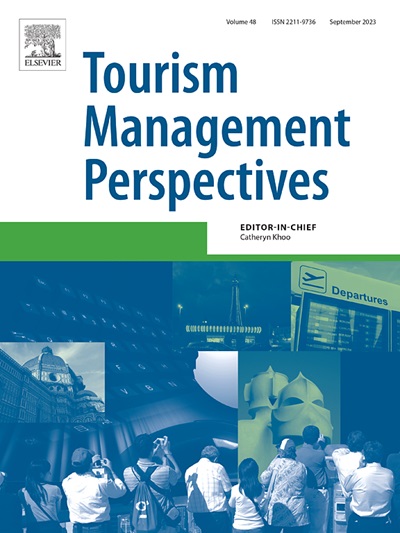The interaction effect of time metaphors and destination-related user-generated content appeal on visit intention: A construal-level perspective
IF 6.9
2区 管理学
Q1 HOSPITALITY, LEISURE, SPORT & TOURISM
引用次数: 0
Abstract
This study aims to explore the interaction effect of time metaphors and destination-related user-generated content (UGC) appeal on visit intention based on construal-level theory. The interaction effect was investigated in three scenario-based experiments. When representing the passage of time, people typically use one of the two time metaphors: the ‘ego-moving’ metaphor, where the ‘self’ moves away from the present toward an event in the future, or the ‘event-moving’ metaphor, where an event moves from the future and approaches the present self. This research has taken a construal-level perspective, suggesting that through the use of differing message appeals, time metaphors can influence the persuasiveness of UGC. The results of three studies suggest that combining an ego-moving (versus event-moving) metaphor with rational (versus emotional) UGC can elevate a person's visit intention and different levels of construal induced by time metaphors act as mediators. Theoretical and managerial implications are also discussed.
时间隐喻与目的地相关用户生成内容吸引力对访问意向的交互效应:构想层面的视角
本研究旨在基于构念水平理论,探讨时间隐喻和目的地相关用户生成内容(UGC)吸引力对访问意向的交互效应。互动效应在三个基于情景的实验中进行了研究。在表示时间流逝时,人们通常会使用两种时间隐喻中的一种:"自我移动 "隐喻,即 "自我 "从现在向未来的事件移动;或 "事件移动 "隐喻,即事件从未来向现在的自我移动。本研究从构思层面的角度出发,认为通过使用不同的信息诉求,时间隐喻可以影响用户体验的说服力。三项研究的结果表明,将自我移动隐喻(相对于事件移动隐喻)与理性(相对于感性)UGC相结合,可以提升人们的访问意向,而时间隐喻所引发的不同构想水平则起到了中介作用。本文还讨论了其理论和管理意义。
本文章由计算机程序翻译,如有差异,请以英文原文为准。
求助全文
约1分钟内获得全文
求助全文
来源期刊

Tourism Management Perspectives
Multiple-
CiteScore
15.60
自引率
3.40%
发文量
99
审稿时长
59 days
期刊介绍:
Tourism Management Perspectives is an interdisciplinary journal that focuses on the planning and management of travel and tourism. It covers topics such as tourist experiences, their consequences for communities, economies, and environments, the creation of image, the shaping of tourist experiences and perceptions, and the management of tourist organizations and destinations. The journal's editorial board consists of experienced international professionals and it shares the board with Tourism Management. The journal covers socio-cultural, technological, planning, and policy aspects of international, national, and regional tourism, as well as specific management studies. It encourages papers that introduce new research methods and critique existing ones in the context of tourism research. The journal publishes empirical research articles and high-quality review articles on important topics and emerging themes that enhance the theoretical and conceptual understanding of key areas within travel and tourism management.
 求助内容:
求助内容: 应助结果提醒方式:
应助结果提醒方式:


